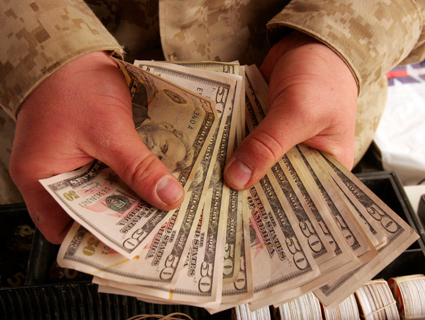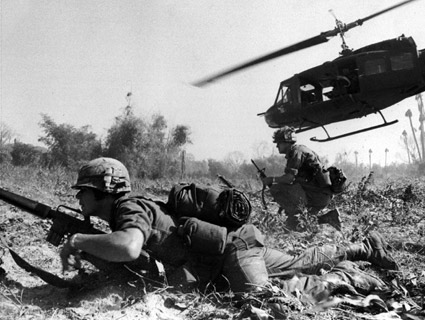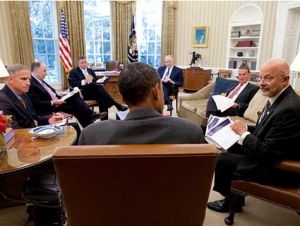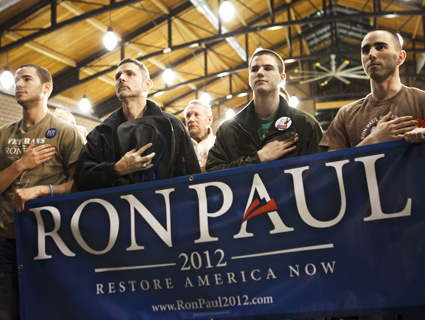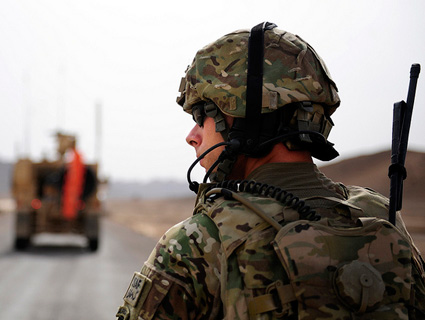
<a href="http://www.flickr.com/photos/soldiersmediacenter/7248329464/in/photostream">US Army</a>/Flickr
Earlier in the week the discussion was all about what defines a hero, and the question came up frequently about when we became so reverent toward military service. Now, it’s probably true that we’ve always had a special place for martial heroism, most societies do. But as one who grew up in a military family I can say that it’s changed a bit over the years in this country. Military service in the two World Wars and Korea was respected, but it was also the subject of satire and criticism to an extent that I honestly don’t think you could do today. There’s not even a Sergeant Bilko or Mister Roberts, much less scathing satire like Catch-22. (In fact, have we had even one great wartime novel emerge during our last 10 years of non-stop war?)
The question is why that would be, and I think the consensus is that it’s a response to the Vietnam Syndrome and the poor way that Vietnam vets were treated by civilians. President Obama referred to it himself in his speech the other day:
When the honourable service of the many should have been praised, you came home and sometimes were denigrated when you should have been celebrated. It was a national shame, a disgrace that should have never happened.
He’s right about that. But I’m fairly sure that he and virtually everyone else has no idea who were among the worst perpetrators.
I discussed Vietnam constantly during the Bush administration on my blog. And this quote from Rick Perlstein (when he was in the middle of researching his epic history of the era Nixonland) may be the one that shocked people the most:
In the now-classic study The Spitting Image: Myth, Memory, and the Legacy of Vietnam, sociologist Jerry Lembke established that the only actual documented examples of the frequently repeated canard that Americans spat upon returning Vietnam veterans came from the kind of World War II veterans who wouldn’t let their brothers back from Vietnam join local American Legion and Veterans of Foreign Wars posts beause they were seen as shameful, as polluted. (The New York Times reported on the phenomenon here.)
They were the kind of veterans who — Gerald Nicosia tells the story in his history of Vietnam Veterans Against the War — greeted the antiwar veterans who had marched 86 miles from Morristown, New Jersey to Valley Forge, Pennsylvania, just like George Washington’s army in 1877.
The World War II veterans heckled them: “Why don’t you go to Hanoi?” “We won our war, they didn’t, and from the looks of them, they couldn’t.”
A Vietnam vet hobbled by on crutches. One of the old men wondered whether he had been “shot with marijuana or shot in battle.”
I forgot, too, about their political interference in a prominent trial. The Legion post in Columbus, Georgia, home of Lt. William Calley’s Fort Benning jail cell, promised they would raise $100,000 to help fund the appeal of the man convicted of murder in the My Lai Massacre “or die trying”: “The real murderers are the demonstrators in Washington,” they said, “who disrupt traffic, tear up public property, who deface the American flag. Lieut. Calley is a hero….. We should elevate him to saint rather than jail him like a common criminal.”
(There’s more here about my own recollection of growing up in those times surrounded by people who said exactly that sort of thing.)
Let me be clear. There is little debate about whether Vietnam vets were treated badly by some left-wing protesters. I’m not saying that never happened. But it’s a lot more complicated than that, and it was as true then as it is now that “the troops” are revered as heroes on the right only as long as they support wars.
I bring this up because I think that unless we can grapple with the real facts of that era, we will not understand that this right-wing pressure to unquestionably portray military service as a sacred act of heroism is self-serving and limited to those who agree with them. Recall this famous exchange on Rush Limbaugh’s show back in 2007:
CALLER2: They never talk to real soldiers. They like to pull these soldiers that come up out of the blue and talk to the media.
LIMBAUGH: The phony soldiers.
CALLER 2: The phony soldiers. If you talk to a real soldier, they are proud to serve. They want to be over in Iraq. They understand their sacrifice, and they’re willing to sacrifice for their country.
It’s always been this way with Limbaugh and the like—and still is.
Heather Digby Parton is guest blogging while Kevin Drum is on vacation.

